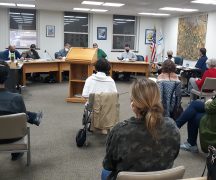By JAN LARSON McLAUGHLIN
BG Independent News
Bowling Green City Council wants to get a handle on the city’s lagging general fund problem before it becomes a crisis.
So prior to the next two council meetings, the Committee of the Whole will meet at 6 p.m. on May 15 and June 5, to talk about building up the city’s general fund revenue.
Council member Bob McOmber advised his fellow council members to talk with constituents and ponder on the possibilities.
“Think long and hard about this topic before that meeting,” he said during Monday’s council meeting. And leave all the options on the table. “Just sort of let the topic percolate in your mind.”
McOmber isn’t expecting council to make any decisions on May 15, other than narrowing down the options to raise more general fund revenue. But by June 5, they should be prepared to choose.
“We’re going to need to move fairly quickly,” he said.
Stagnant revenue and increasing expenses have Bowling Green City Council looking at ways to bring more money into the city’s general fund. The city’s gains in income tax revenue have been eaten away by state and federal funding cuts in the past decade. The budget for 2017 lists revenue of $14,996,197 and appropriations of $15,623,253 – which means it is cutting into the balance by $627,056, and is not sustainable.
The city’s overall revenue continues to be flat, as costs continue to escalate. While income tax revenue is up, the city continues to take hits from interest revenue, intergovernmental fund cuts such as estate tax losses, and the end to its cable franchise income. Local government funds shrank from 18 percent of the general fund a decade ago, to 7 percent now. The local government fund loss was about $600,000 annually, the loss of the cable franchise fee was about $300,000 a year, and the loss of estate tax averaged about $700,000 a year.
Eight ideas have been presented for generating revenue for the city general fund:
- Redistribution of the city income tax. This would not be a tax increase, but would require a public vote since it would switch how the funding is used. This would likely increase water and sewer rates, which are “extremely low” because so much funding from the general fund is now used for those services.
- Reduction in police and fire staffing, which are the largest part of the general fund. The negatives of such cuts could be longer response times, decrease in safety for citizens and staff of the police and fire divisions, and increased overtime costs. It was also noted that citizens have always supported fire and police levies at the polls, and cuts to services could jeopardize accreditations and push up insurance rates.
- Increase income tax rate. That option would “send a wrong message” to businesses if the city went above its current 2 percent tax rate, McOmber said.
- Cut funding assistance to other entities, such as the county airport, annual fireworks, convention and visitors bureau, and surrounding townships. That option could result in strained relationships in the long run.
- Privatize garbage and recyclable services, which cost $693,000 a year. Several other cities in the region have already privatized their refuse pickup or charge a direct fee for the service. The city could seek bids for garbage collection and could sell its equipment. Each of the five recycling trucks cost $250,000 and last about 10 years. The negatives of this option include four city employees being laid off, the need for the public to pay a fee, and the loss of local response to citizen concerns.
- Privatize refuse collections, but keep the four employees who also do other jobs like plow snow. Those employees could shift over to offer some city services that had previously been cut, like monthly brush pickups and crack sealing of pavements. That option could save about $371,000.
- Cut the city arborist. However, Bowling Green officials are very proud of their long-running Tree City status, and the arborist handles disease management and plantings.
- Institute a special assessment for tree services and the arborist, like a street cleaning assessment that is charged on property taxes.
As McOmber studied the possibilities, he came up with a list of characteristics for “good options.”
First, an option that is relatively broad based, affecting a lot of people in a minimal way, to “spread the pain around” would be advisable.
Second, the action should only benefit the city’s general fund, since that is the only fund that has been hurt by the cuts. For that reason, McOmber said an income tax increase is “not a very good option.”
Third, a change that is seamless and barely noticed by residents would be desirable.
And last, the option should raise close to the money needed. “We’re looking for that happy medium,” where too much money isn’t generated and too little isn’t raised so the city is back at the drawing board again in a couple years.
“This is a structural problem with the general fund,” McOmber said. It is ongoing, not temporary.
So while the shortfall in this year’s budget has been identified as $627,000, the structural deficit is actually more – closer to $800,000 or $1 million a year, he said.
“There’s a tendency to cut it too close,” and go with the least painful option. But that may not solve the problem, he said.
Council member Bruce Jeffers said the income tax increase is not out of the question for him. “That, for me, is still on the table,” he said.
“I think we all understand the importance,” of the issue, council president Mike Aspacher said.
Later in Monday’s meeting, City Council approved an emergency ordinance to enter a contract with the city’s fire division union. McOmber said this is the first of five union negotiations this year to be settled.
The contract includes raises of 1.5 percent this year, 2 percent next year, and 2.5 percent the following year. McOmber said some people may ask why the city is giving raises when the general fund is facing tough times.
“We have a problem, not a crisis,” he said.
When times are good, the standard raises are 3 percent. City officials believe it’s important to give some raises, even if less than normal, to keep employees motivated and to keep them from leaving for other jobs, McOmber said. “Even in times that are not ideal,” he added. “I’m fully supportive of this contract and the raises in them.”
Aspacher agreed. “It’s important to reward our employees for their hard work,” especially if the city wants to attract and retain quality employees. “It’s important to do what we can, when we can.”





